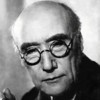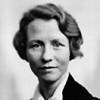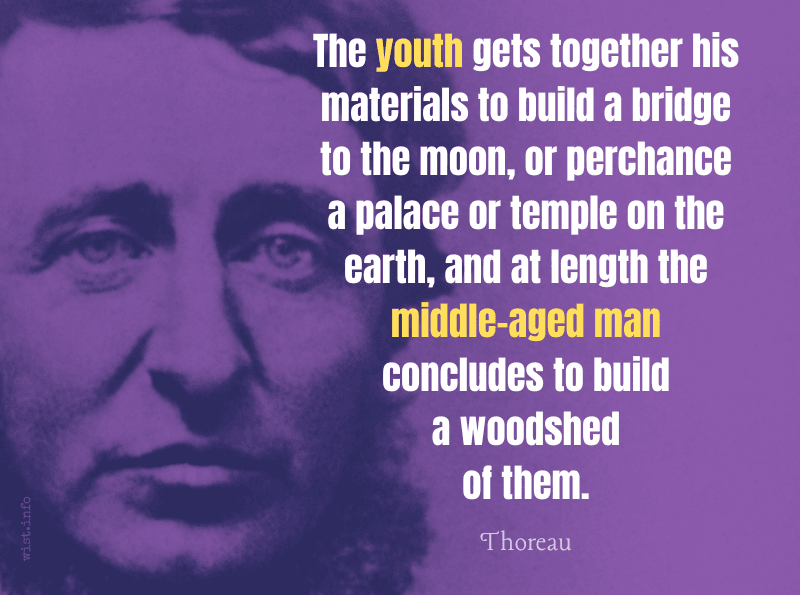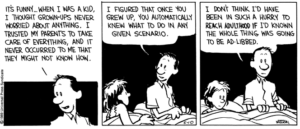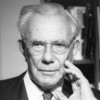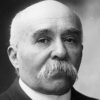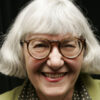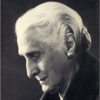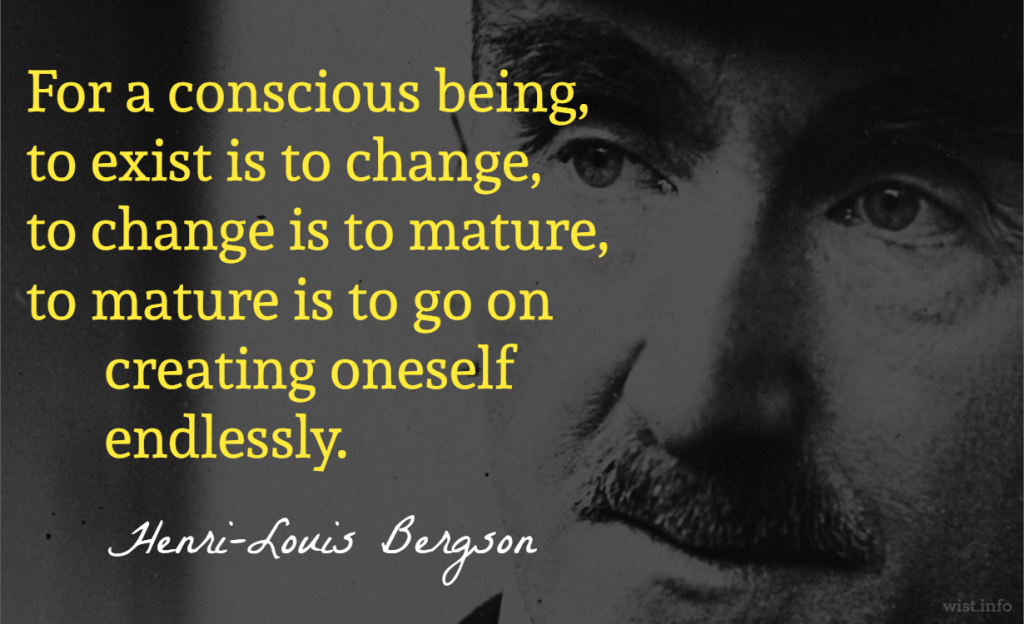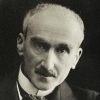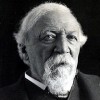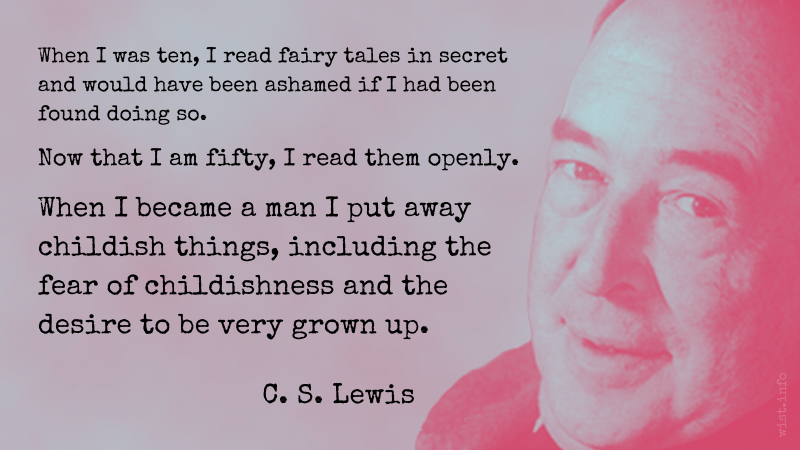You are under no obligation to remain the same person you were a year ago, a month ago, or even a day ago. You are here to create yourself, continuously.
Richard Feynman (1918-1988) American physicist
(Spurious)
Not found in his writings, lectures, or speeches. See Who do you think you are kidding, Mr Feynman – Terence Eden’s Blog for more discussion.
It is possibly a misattributed variant of something said by Alan Watts ...You are under no obligation to be the same person you were five minutes ago.
... which may or may not actually be authentic, either.
Quotations about:
maturity
Note not all quotations have been tagged, so Search may find additional quotes on this topic.
Young people are ill-advised if they yield to the pressure of the old in any vital matter.
Bertrand Russell (1872-1970) English mathematician and philosopher
Conquest of Happiness, Part 1, ch. 9 “Fear of Public Opinion” (1930)
(Source)
CALVIN: How come grown-ups don’t go out to play?
CALVIN’S DAD: Grown-ups can only justify playing outside by calling it exercise, doing it when they’d rather not, and keeping records to quantify their performance.
CALVIN: That sounds like a job.
CALVIN’S DAD: … Except you don’t get paid.
CALVIN: So play is worse than work?
CALVIN’S DAD: Being a grown-up is tough.
The true wisdom is to be always seasonable, and to change with a good grace in changing circumstances. To love playthings well as a child, to lead an adventurous and honourable youth, and to settle when the time arrives, into a green and smiling age, is to be a good artist in life and deserve well of yourself and your neighbour.
Youth is a wonderful thing. What a crime to waste it on children.
George Bernard Shaw (1856-1950) Irish playwright and critic
(Attributed)
Widely attributed to Shaw (also to Oscar Wilde), but no actual source has been found.
For more discussion of this quotations origin, see Quote Origin: Youth Is Wasted on the Young – Quote Investigator®.
And therefore all my trifling Songs adieu,
I now design to seek what’s good and true,
And that alone; I scorn my wanton Muse,
And lay up Precepts, such as I may use.[Nunc itaque et versus et cetera ludicra pono;
quid verum atque decens curo et rogo et omnis in hoc sum;
condo et compono quae mox depromere possim.]Horace (65-8 BC) Roman poet, satirist, soldier, politician [Quintus Horatius Flaccus]
Epistles [Epistularum, Letters], Book 1, ep. 1, l. 10ff (1.1.10-12) (20 BC) [tr. Creech (1684)]
(Source)
This epistle was written when Horace was 45 and decided to quit writing lyric poetry, having finished his third book of Odes.
(Source (Latin)). Other translations:And therefore now I lay my rimes. and other toyes asyde
Devysing things of honestie, and therin holy byde.
That whych may serve to guide my selfe I muse uppon and make.
[tr. Drant (1567)]Therefore Love-songs, and all those toyes adieu,
My work is now to search what's good, what's true:
I lay in precepts, which I straight may draw
Out for my use.
[tr. Fanshawe; ed. Brome (1666)]Then here farewell the amusements of my youth:
Farewell to verses; for the search of truth
And moral decency hath fill'd my breast,
Hath every thought and faculty possest;
And I now form my philosophic lore,
For all my future life a treasur'd store.
[tr. Francis (1747)]Henceforth adieu then to the toys of youth!
Adieu to wit's light sport, and welcome truth!
To con the maxims of the good and wise,
To search where honour and where fitness lies,
Careful to store what after-life may need --
This be my task; for this is wealth indeed!
[tr. Howes (1845)]Now therefore I lay aside both verses, and all other sportive matters; my study and inquiry is after what is true and fitting, and I am wholly engaged in this: I lay up, and collect rules which I may be able hereafter to bring into use.
[tr. Smart/Buckley (1853)]So now I bid my idle songs adieu,
And turn my thoughts to what is right and true;
I search and search, and when I find, I lay
The wisdom up against a rainy day.
[tr. Conington (1874)]So verses now and all such toys I quit,
Work night and day to find the true and fit.
The lore of sages cull where'er I may.
And hive it up for use some future day.
[tr. Martin (1881)]Now, therefore, I resign verse composition and sportive measures. What is true and fitting I care for, and inquire about, and am absorbed in it. I am piling up and arranging what I may presently make public.
[tr. Elgood (1893)]So now I lay aside my verses and all other toys. What is right and seemly is my study and pursuit, and to that am I wholly given. I am putting by and setting in order the stores on which I may some day draw.
[tr. Fairclough (Loeb) (1926)]So I lay down my poems and other toys of my youth
To devote myself to one main subject: the truth.
What is right and honest? This I would like to know.
I am laying up stores, setting them all in a row,
Of the only thing that will keep on helping me grow.
[tr. Palmer Bovie (1959)]So now I lay my verses down, and all my other games,
to study what is true and good, totally involved in that.
I gather and accumulate supplies that I'll soon use.
[tr. Fuchs (1977)]So I've put away poetry
And other games. I study
Right and wrong. I store up,
Now, what someday I'll need, I lay
It all out.
[tr. Raffel (1983)]And so I'm giving up my verses and all
Other foolishness of the sort, and now
Devote myself entirely to the study
Of what is genuine and right for me,
Storing up what I learn for the sake of the future.
[tr. Ferry (2001)]So now I am laying aside my verses and other amusements.
My sole concern is the question "What is right and proper?"
I'm carefully storing things for use in the days ahead.
[tr. Rudd (2005 ed.)]So now I’m setting aside my verse, and other tricks:
My quest and care is what’s right and true, I’m absorbed
In it wholly: I gather, then store for later use.
[tr. Kline (2015)]
Undying hope is co-ruler of the human bosom with infallible credulity. A man finds he has been wrong at every preceding stage of his career, only to deduce the astonishing conclusion that he is at last entirely right.
In short, if youth is not quite right in its opinions, there is a strong probability that age is not much more so.
If one could recover the uncompromising spirit of one’s youth, one’s greatest indignation would be for what one has become.
[Si l’on pouvait recouvrer l’intransigeance de la jeunesse, ce dont on s’indignerait le plus, c’est de ce qu’on est devenu.]
André Gide (1869-1951) French author, Nobel laureate
The Counterfeiters [Les Faux-monnayeurs], ch. 18 [La Pérouse] (1925) [tr. Bussy (1927)]
(Source)
You need repent none of your youthful vagaries. They may have been over the score on one side, just as those of age are probably over the score on the other. But they had a point; they not only befitted your age and expressed its attitude and passions, but they had a relation to what was outside of you, and implied criticisms on the existing state of things, which you need not allow to have been undeserved, because you now see that they were partial.
Often an opinion, a custom, seems absurd when we are young, and advancing in life, we find the reason. Mustn’t we conclude that certain habits aren’t so ridiculous? One is lead to think sometimes that they were established by people who had read the entire book of life, and that they are judged by people who, despite their esprit, have only read a few pages.
[Souvent une opinion, une coutume commence à paraître absurde dans la première jeunesse, et en avançant dans la vie, on en trouve la raison; elle paraît moins absurde. En faudrait-il conclure que de certaines coutumes sont moins ridicules? On serait porté à penser quelquefois qu’elles ont été établies par des gens qui avaient lu le livre entier de la vie, et qu’elles sont jugées par des gens qui, malgré leur esprit, n’en ont lu que quelques pages.]
Nicolas Chamfort (1741-1794) French writer, epigrammist (b. Nicolas-Sébastien Roch)
Products of Perfected Civilization [Produits de la Civilisation Perfectionée], Part 1 “Maxims and Thoughts [Maximes et Pensées],” ch. 1, ¶ 21 (1795) [tr. Siniscalchi (1994)]
(Source)
Compare to also Chamfort.(Source (French)). Alternate translations:Often in early youth an opinion or custom seems absurd to us, which, with advancing years, we discover has some justification and so appears less absurd. Ought we to conclude from this that certain customs are not so ridiculous as others? One might sometimes be tempted to think that they were established by people who had read the book of life through, and that they are judged by those who, despite their intelligence, have only glanced at a few pages.
[tr. Hutchinson (1902)]Often an opinion or custom seems absurd to us in early youth; but as we advance in life we see the reason for it, and it appears less fatuous. Must we conclude from this that certain customs actually are less absurd? One is sometimes led to suppose that they have been established by folk who have read the whole of the book of life, and that they are criticized by those who, in spite of their intelligence, have only read a page or two at best.
[tr. Mathers (1926)]Often an opinion, a custom, seems absurd to begin with, when one is very young, and as one advances in life one learns the reason for it, and it seems less so. Must one conclude, then, that certain customs have become less ridiculous? At times one is drawn to the conclusion that they were established by persons who had read the book of life entire, and are judged by others who have read only a few pages.
[tr. Merwin (1969)]Often an opinion, or a custom, begins to seem absurd in one's early youth, and, as life advances, one finds the reason for it; it seems less absurd. Is one ot conclude that certain customs are less ridiculous? One would sometimes be inclined to think that they had been laid down by people who had read the entire book of life, and that they are judged by people who, in spite of their intellect, have only read a few pages of it.
[tr. Pearson (1973)]To the very young some opinions or customs seem absurd, but as you grow older you realize the reason behind them and they seem less absurd. Are we to conclude that certain customs aren't as ridiculous as they seem? There are times when you feel that they've been created by people who've read the book of life from cover to cover and that they're being judged by those who, however intelligent, have read only a few pages.
[tr. Parmée (2003), ¶ 20]
When the old man waggles his head and says, “Ah, so I thought when I was your age,” he has proved the youth’s case. Doubtless, whether from growth of experience or decline of animal heat, he thinks so no longer; but he thought so while he was young; and all men have thought so while they were young, since there was dew in the morning or hawthorn in May; and here is another young man adding his vote to those of previous generations and riveting another link to the chain of testimony.
“I am old, Peter. I am ever so much more than twenty. I grew up long ago.”
“You promised not to!”
“I couldn’t help it.”J. M. Barrie (1860-1937) Scottish novelist and dramatist [James Matthew Barrie]
Peter and Wendy, ch. 17 “When Wendy Grew Up” (1911)
(Source)
Wendy speaking to Peter, who has returned many years later, though he is unaware of the interval.
Because I have reached Paris, I am not ashamed of having passed through Newhaven and Dieppe. They were very good places to pass through, and I am none the less at my destination. All my old opinions were only stages on the way to the one I now hold, as itself is only a stage on the way to something else.
MRS. DARLING: (from the window) Peter, where are you? Let me adopt you too. (She is the loveliest age for a woman, but too old to see PETER clearly.)
PETER: Would you send me to school?
MRS. DARLING: (obligingly) Yes.
PETER: And then to an office?
MRS. DARLING: I suppose so.
PETER: Soon I should be a man?
MRS. DARLING: Very soon.
PETER: (passionately) I don’t want to go to school and learn solemn things. No one is going to catch me, lady, and make me a man. I want always to be a little boy and to have fun.
J. M. Barrie (1860-1937) Scottish novelist and dramatist [James Matthew Barrie]
Peter Pan, Act 5 (1904, pub. 1928)
(Source)
In Barrie's novelization, Peter and Wendy, ch. 17 "When Wendy Grew Up" (1911), this is rendered:Mrs. Darling came to the window, for at present she was keeping a sharp eye on Wendy. She told Peter that she had adopted all the other boys, and would like to adopt him also.
“Would you send me to school?” he inquired craftily.
“Yes.”
“And then to an office?”
“I suppose so.”
“Soon I should be a man?”
“Very soon.”
“I don’t want to go to school and learn solemn things,” he told her passionately. “I don’t want to be a man. O Wendy’s mother, if I was to wake up and feel there was a beard!”
“Peter,” said Wendy the comforter, “I should love you in a beard;” and Mrs. Darling stretched out her arms to him, but he repulsed her.
“Keep back, lady, no one is going to catch me and make me a man.”
The fault no child ever loses is the one he was most punished for.
Mignon McLaughlin (1913-1983) American journalist and author
The Neurotic’s Notebook, ch. 2 (1963)
(Source)
Was it for this I uttered prayers,
And sobbed and cursed and kicked the stairs,
That now, domestic as a plate,
I should retire at half-past eight?Edna St. Vincent Millay (1892-1950) American poet
Poem (1920), “Grown-Up,” A Few Figs from Thistles, (1921, expanded ed.)
(Source)
The poem was not in the original 1920 publication.
The youth gets together his materials to build a bridge to the moon, or perchance a palace or temple on the earth, and at length the middle-aged man concludes to build a woodshed of them.
Of course everybody likes and respects self-made men. It is a great deal better to be made in that way than not to be made at all.
PETER: Because I heard father and mother talking of what I was to be when I became a man. I want always to be a little boy and to have fun; so I ran away to Kensington Gardens and lived a long time among the fairies.
J. M. Barrie (1860-1937) Scottish novelist and dramatist [James Matthew Barrie]
Peter Pan, Act 1 (1904, pub. 1928)
(Source)
In Barrie's 1911 novelization, Peter and Wendy, ch. 3 "Come Away, Come Away!" this is rendered:“It was because I heard father and mother,” he explained in a low voice, “talking about what I was to be when I became a man.” He was extraordinarily agitated now. “I don’t want ever to be a man,” he said with passion. “I want always to be a little boy and to have fun. So I ran away to Kensington Gardens and lived a long long time among the fairies.”
Towering is the confidence of twenty-one.
Samuel Johnson (1709-1784) English writer, lexicographer, critic
Letter (1759-01-09) to Bennet Langton [paraphrase]
(Source)
While usually quoted as above, the actual passage reads:When I was as you are now, towering in the confidence of twenty-one, little did I suspect that I should be at forty-nine, what I now am.
Langton was only 14-15 at the time.
The letter is itself misdated (and often mis-cited) as being in 1758 when it was actually written in 1759 (based on Johnson's stated age and other internal evidence).
In James Boswell, The Life of Samuel Johnson, Vol. 1: 1709-1765 (1791).
Did you ever think what a waste it would be if you burned a man for what he believed at twenty, when what he might believe and write at forty would be hailed as the most blessed of holy writ?
Ellis Peters (1913-1995) English writer, translator [pseud. of Edith Mary Pargeter, who also wrote under the names John Redfern, Jolyon Carr, Peter Benedict]
The Heretic’s Apprentice, ch. 13 [Elave] (1990)
(Source)
Years ago we discovered the exact point, the dead center of middle age. It occurs when you are too young to take up golf and too old to rush up to the net.
Franklin Pierce Adams (1881-1960) American journalist and humorist ["F. P. A."]
Nods and Becks (1944)
(Source)
Originally published in Franklin's "Conning Tower" newspaper column during 1934-1935.
All children, except one, grow up. They soon know that they will grow up, and the way Wendy knew was this. One day when she was two years old she was playing in a garden, and she plucked another flower and ran with it to her mother. I suppose she must have looked rather delightful, for Mrs. Darling put her hand to her heart and cried, “Oh, why can’t you remain like this for ever!” This was all that passed between them on the subject, but henceforth Wendy knew that she must grow up. You always know after you are two. Two is the beginning of the end.
J. M. Barrie (1860-1937) Scottish novelist and dramatist [James Matthew Barrie]
Peter and Wendy, ch. 1 “Peter Breaks Through” (1911)
(Source)
Opening words, not included in the play.
Yung phools are comparatiff harmless, it iz the old phools that make most ov the trubble in this world.
[Young fools are comparatively harmless; it is the old fools that make most of the trouble in this world.]
Josh Billings (1818-1885) American humorist, aphorist [pseud. of Henry Wheeler Shaw]
Josh Billings’ Trump Kards, ch. 6 “Pets” (1874)
(Source)
You do not chop off a section of your imaginative substance and make a book specifically for children, for — if you are honest — you have no idea where childhood ends and maturity begins. It is all endless and all one.
P. L. Travers (1899-1996) Australian-British writer [Pamela Lyndon Travers; b. Helen Lyndon Goff]
Essay (1978-07-02), “I Never Wrote for Children,” New York Times
(Source)
By the bye, as I must leave off being young, I find many douceurs [sweets] in being a sort of chaperon, for I am put on the sofa near the fire and can drink as much wine as I like.
Jane Austen (1775-1817) English author
Letter (1813-11-06) to Cassandra Austen
(Source)
Jane was 38 at the time.
When we think of loss we think of the loss, through death, of people we love. But loss is a far more encompassing theme in our life. For we lose not only through death, but also by leaving and being left, by changing and letting go and moving on. And our losses include not only our separations and departures from those we love, but our conscious and unconscious losses of romantic dreams, impossible expectations, illusions of freedom and power, illusions of safety — and the loss of our own younger self, the self that thought it would always be unwrinkled and invulnerable and immortal.
Judith Viorst (b. 1931) American writer, journalist, psychoanalysis researcher
Necessary Losses, Introduction (1986)
(Source)
Sum folks, az they gro older, gro wizer; but most folks simply gro stubbornner.
[Some folks, as they grow older, grow wiser; but most folks simply grow more stubborn.]Josh Billings (1818-1885) American humorist, aphorist [pseud. of Henry Wheeler Shaw]
Everybody’s Friend, Or; Josh Billing’s Encyclopedia and Proverbial Philosophy of Wit and Humor, ch. 148 “Affurisms: Ink Brats” (1874)
(Source)
It is well we cannot see into the future. There are few boys of fourteen who would not feel ashamed of themselves at forty.
Jerome K. Jerome (1859-1927) English writer, humorist [Jerome Klapka Jerome]
Idle Thoughts of an Idle Fellow, “On Memory” (1886)
(Source)
First published in Home Chimes (1885-09-26).
GALE: Childhood is Last Chance Gulch for happiness. After that, you know too much.
Tom Stoppard (1937-2025) Czech-English playwright and screenwriter
Where Are They Now? (1968)
(Source)
The uses of a dictionary: at thirteen we look up lewd, licentious, lascivious; at thirty, febrile and inchoate; at fifty, endostosis.
Mignon McLaughlin (1913-1983) American journalist and author
The Neurotic’s Notebook, ch. 10 (1963)
(Source)
Man comes to each age of his life as a novice.
[L’homme arrive novice à chaque âge de la vie.]
Nicolas Chamfort (1741-1794) French writer, epigrammist (b. Nicolas-Sébastien Roch)
Products of Perfected Civilization [Produits de la Civilisation Perfectionnée], Part 2 “Characters and Anecdotes [Caractères et Anecdotes],” ch. 12 (1795) [tr. Merwin (1969)]
(Source)
(Source (French)). Alternate translations:Man arrives a novice at every age of life.
[ed. Mathews (1878)]Man reaches each stage in his life as a novice.
[tr. Hutchinson (1902), "The Cynic's Breviary"]A man begins every stage of his life as a novice.
[tr. Parmée (2003), ¶ 422]
Few books can please us throughout life. For some we lose all liking as we grow in age, wisdom, or good sense.
[Peu de livres peuvent plaire toute la vie. Il y en a dont on se dégoûte avec le temps, la sagesse ou le bon sens.]
Joseph Joubert (1754-1824) French moralist, philosopher, essayist, poet
Pensées [Thoughts], ch. 23 “Des Qualités de l’Écrivain [Of the Qualities of Writers],” ¶ 178 (1850 ed.) [tr. Attwell (1896), ¶ 375]
(Source)
(Source (French)). Alternate translations:Few books give life-long pleasure. There are some for which, with the growth of time, wisdom, and good sense, we lose all taste.
[tr. Lyttelton (1899), ch. 22, ¶ 84]
CALVIN’S DAD: It’s funny … when I was a kid, I thought grown-ups never worried about anything. I trusted my parents to take care of everything, and it never occurred to me that they might not know how. I figured that once you grew up, you automatically knew what to do in any given scenario. I don’t think I would have been in such a hurry to reach adulthood if I’d know the whole thing was going to be ad-libbed.
Bill Watterson (b. 1958) American cartoonist
Calvin and Hobbes (1989-05-10)
(Source)
After their house has been burgled.
Nothing — so it seems to me — is more beautiful than the love that has weathered the storms of life. The sweet, tender blossom that flowers in the heart of the young — in hearts such as yours — that, too, is beautiful. The love of the young for the young, that is the beginning of life. But the love of the old for the old, that is the beginning of — of things longer.
Jerome K. Jerome (1859-1927) English writer, humorist [Jerome Klapka Jerome]
“Passing of the Third Floor Back” [The Stranger] (1908)
(Source)
If you reside in a state where you attain your legal majority while still in your teens, pretend that you don’t. There isn’t an adult alive who would want to be contractually bound by a decision he came to at the age of nineteen.
One ov the most diffikult, and at the sametime one ov the most necessary, things for us old phellows to know, is that we aint ov so mutch ackount now az we waz.
[One of the most difficult, and at the same time one of the most necessary, things for us old fellows to know, is that we aren’t of so much account now as we were.]Josh Billings (1818-1885) American humorist, aphorist [pseud. of Henry Wheeler Shaw]
Everybody’s Friend, Or; Josh Billing’s Encyclopedia and Proverbial Philosophy of Wit and Humor, ch. 131 “Affurisms: Plum Pits (1)” (1874)
(Source)
The superstition into which we’re born,
Even when we recognize it, loses not
Its power on us! Not all those are free
Who ridicule their chains.[Der Aberglaub’, in dem wir aufgewachsen,
Verliert, auch wenn wir ihn erkennen, darum
Doch seine Macht nicht über uns. — Es sind
Nicht alle frei, die ihrer Ketten spotten.]Gotthold Lessing (1729-1781) German playwright, philosopher, dramaturg, writer
Nathan the Wise [Nathan der Weise], Act 4, sc. 4 [Templar] (1779) [tr. Corbett (1883)]
(Source)
(Source (German)). Alternate translations:Yet the superstition
in which we have grown up, not therefore loses
when we detect it, all its influence on us.
Not all are free that can bemock their fetters.
[tr. Taylor (1790)]The superstition in which we grew up,
Does not cease influencing us, e'en after
We have discover'd its absurdity.
Not all are free who do bemock their fetters.
[tr. Reich (1860)]The superstition in which we were brought up never loses its power over us, even after we understand it.
[Source (1866)]And yet the superstitions we have learned
From education, do not lose their power
When we have found them out; nor are all free
Whose judgment mocks the galling chains they wear.
[tr. Boylan (1878)]The superstition in which we have grown up
Does not lose (even if we see through it)
Its power on us, on that account;
All are not free who mock their chains.
[tr. Jacks (1894)]The superstitions of our early years,
E'en when we know them to be nothing more,
Lose not for that their hold upon our hearts;
Not all are free who ridicule their chains.
[tr. Maxwell (1917)]The superstition in which we have grown up does not lose its power over us even for the reason that we recognize it as such. Not all are free who mock their chains.
[tr. Reinhardt (1950)]The superstition in which we grew up,
Though we may recognize it, does not lose
Its power over us -- Not all are free
Who make mock of their chains.
[tr. Morgan (1955)]Merely because we see the defects of the superstition we grew up in, it doesn't lose its hold upon our souls! Those men who mock their chains are not all free!
[tr. Ade (1972)]
Maturity is a bitter disappointment for which no remedy exists, unless laughter can be said to remedy anything.
Kurt Vonnegut, Jr. (1922-2007) American novelist, journalist
Cat’s Cradle, ch. 88 [Bokonon] (1963)
(Source)
The awareness of the ambiguity of one’s highest achievements (as well as one’s deepest failures) is a definite symptom of maturity.
Paul Tillich (1886-1965) American theologian and philosopher
Quoted in Time (1963-05-17)
(Source)
Speech given at the 40th Anniversary Dinner for Time, reported in the following week's magazine.
That the world can be improved and yet must be celebrated as it is are contradictions. The beginning of maturity may be the recognition that both are true.
William M. Stott (b. 1940) American diplomat, academic in American Studies and English, author
Documentary Expression and Thirties America, ch. 15 (1973)
(Source)
Closing words of the book.
Mature people relate to each other without the need to merge.
Maturity is a high price to pay for growing up.
Tom Stoppard (1937-2025) Czech-English playwright and screenwriter
Where Are They Now? [Gale] (1970)
(Source)
The line in the play -- originally broadcast on BBC Radio 3 -- was based on an answer Stoppard himself gave in an interview by Peter Evans, reprinted in David Bailey and Peter Evans, Goodbye Baby and Amen: A Saraband for the Sixties (1969):It is a very immature thing to worry about one’s stinking youth, but I don’t care: I think age is a very high price to pay for maturity.
But genius is nothing more nor less than childhood recovered at will — a childhood now equipped for self-expression with manhood’s capacities and a power of analysis which enables it to order the mass of raw material which it has involuntarily accumulated.
[Le génie n’est que l’enfance retrouvée à volonté, l’enfance douée maintenant, pour s’exprimer, d’organes virils et de l’esprit analytique qui lui permet d’ordonner la somme de matériaux involontairement amassée.]Charles Baudelaire (1821-1867) French poet, essayist, art critic
“Le Peintre de la Vie Moderne [The Painter of Modern Life],” sec. 3 (1863) [tr. Mayne (1964)]
(Source)
(Source (French)). Alternate translations:But genius is simply childhood recovered at will, a childhood now equipped for self-expression, with mature faculties and an analytic spirit which permit him to set in order the mass of raw material he has involuntarily accumulated.
[tr. Kline (2020)]Genius is only childhood recovered at will, childhood now gifted to express itself with the faculties of manhood and with the analytic mind that allows him to give order to the heap of unwittingly hoarded material.
[Source]But genius is no more than childhood recaptured at will, childhood equipped now with man’s physical means to express itself, and with the analytical mind that enables it to bring order into the sum of experience, involuntarily amassed.
[Source]
In a fit of exasperation, Miss Manners once demanded of a six-year-old person how it could be so childish and was forced to admit the justice of its reply, “I’m a child.”
My son, young men’s arms are indeed taut for action, but old men’s counsels are better; for time teaches the most subtle lessons.
Euripides (485?-406? BC) Greek tragic dramatist
Bellerophon [Βελλεροφῶν], frag. 291 (TGF) (c. 430 BC) [tr. Collard, Hargreaves, Cropp (1995)]
(Source)
Alternate translation:Son, the hands of young men always itch for action, but the
judgment of the old is sounder.
Time teaches discrimination
[tr. Stevens (2012)]
The course of a man’s life is certain. The path that we follow goes in only one direction. Every mile is distinctly marked with its own peculiar characteristic — the vulnerability of infants, the animal high spirits of adolescents, the seriousness of adults, the maturity of old men — and at each of these stages we must accept gracefully what Nature grants us.
[Cursus est certus aetatis et una via naturae eaque simplex, suaque cuique parti aetatis tempestivitas est data, ut et infirmitas puerorum et ferocitas iuvenum et gravitas iam constantis aetatis et senectutis maturitas naturale quiddam habet, quod suo tempore percipi debeat.]
Marcus Tullius Cicero (106-43 BC) Roman orator, statesman, philosopher
De Senectute [Cato Maior; On Old Age], ch. 10 / sec. 33 (10.33) (44 BC) [tr. Cobbold (2012)]
(Source)
(Source (Latin)). Alternate translations:The cours and the weye of age is certeyne and determyned by nature, whiche hathe onely awey which is symple & is nothyng different more in the one than in the othir. But each go by that symple and determyned wey aftir the degrees in their cours from the one age in to that other. And yet nature had given to every part of age his owne propre season and tyme, and hir pertynent cours of usage in kynde. That is to witt, that sekenesse and maladye is appropryd to the age of puerice in childhode, & cruelte is appropryd to the age of yongth, worshipfulnesse and sadnesse of maners be appropryd to the age of virilite whiche is the fyfthe age. Moderaunce and temperaunce be appropryd to olde age. Eueriche oweth to have sumwhat naturelly and appropryd unto that whiche may be gadird in his tyme.
[tr. Worcester/Worcester/Scrope (1481), Part 3]The race and course of age is certain; and there is but one way of nature and the same simple; and to every part of a man's life and age are given his convenient times and proper tempestivities. For even as weakness and infirmity is incident to young children, lustiness and bravery to young men, and gravity when they come to ripe years; so, likewise the maturity or ripeness of old age have a certain special gift given and attributed to it by nature, which ought not to be neglected, but to be taken in his own time and season when it cometh.
[tr. Newton (1569)]There is but one course of age, and one way of nature, and the same simple, and to every part of age its own timelines is given; for as infirmity belongs to child-hood, fiercenesse to youth, and gravity to age, so the true ripenesse of age hath a certaine natural gravity in it, which ought to be used in it own time.
[tr. Austin (1648)]Simple, and certain Nature's wayes appear,
As she sets forth the seasons of the year.
So in all parts of life we find her truth,
Weakness to childhood, rashness to our youth:
To elder years to be discreet and grave,
Then to old age maturity she gave.
[tr. Denham (1669)]Every Age has something in it, peculiar to it self: as Weakness to our Infancy, an unguided Warmth to Youth, Seriousness to Manhood, and a certain Maturity of Judgment to Old Age, which we may expect to reap the Fruits of, when advanced to it.
[tr. Hemming (1716)]Life has a sure Course, and Nature but one Way, that that too simple and plain. And to every Part of Man's Age a peculiar Propriety of Temper is given: Thus Weakness in Children, a Boldness in Youth, and a Gravity in Manhood appears; and a full Ripeness of Years has always something which seems natural to it, and which ought to be made use of at a proper Time.
[tr. J. D. (1744)]The Stages of Life are fixed; Nature is the same in all, and goes on in a plain and steady Course: Every Part of Life, like the Year, has its peculiar Season: As Children are by Nature weak, Youth is rash and bold; staid Manhood more solid and grave; and so Old-Age in its Maturity, has something natural to itself, that ought particularly to recommend it.
[tr. Logan (1750)]Nature conducts us, by a regular and insensible progression through the different seasons of human life; to each of which she has annexed its proper and distinguishing characteristic. As imbecility is the attribute of infancy, ardour of youth, and gravity of manhood; so declining age has its essential properties, which gradually disclose themselves as years increase.
[tr. Melmoth (1773)]The course of life is fixed, and the path of nature is one, and that simple. And its own proper seasonableness has been given to each division of life; so that both the feebleness of boys and the proud spirit of young men, and the gravity of a now settle period of life, and the maturity of old age, has something natural to it, which ought to be gathered in its own season.
[Cornish Bros. ed. (1847)]There is a definite career in life, and one way of nature, and that a simple one; and to every part ot life its own peculiar period has been assigned: so that both the feebleness of boys, and the high spirit of young men, and the steadiness of now fixed manhood, and the maturity of old age, have something natural, which ought to be enjoyed in their own time.
[tr. Edmonds (1874)]Life has its fixed course, and nature one unvarying way; each age has assigned to it what best suits it, so that the fickleness of boyhood, the sanguine temper of youth, the soberness of riper years, and the maturity of old age, equally have something in harmony with nature, which ought to be made availing in its season.
[tr. Peabody (1884)]The course of life is fixed, and nature admits of its being run but in one way, and only once; and to each part of our life there is something specially seasonable; so that the feebleness of children, as well as the high spirit of youth, the soberness of maturer years, and the ripe wisdom of old age -- all have a certain natural advantage which should be secured in its proper season.
[tr. Shuckburgh (1895)]One only way
Nature pursues, and that a simple one:
To each is given what is fit for him.
The boy is weak: youth is more full of fire:
Increasing years have more of soberness:
And as in age there is a ripeness too.
Each should be garnered at its proper time,
And made the most of.
[tr. Allison (1916)]Life's race-course is fixed; Nature has only a single path and that path is run but once, and to each stage of existence has been allotted its own appropriate quality; so that the weakness of childhood, the impetuosity of youth, the seriousness of middle life, the maturity of old age -- each bears some of Nature's fruit, which must be garnered in its own season.
[tr. Falconer (1923)]The course of life is clear to see; nature has only one path, and it has no turnings. Each season of life has an advantage peculiarly its own; the innocence of children, the hot blood of youth, the gravity of the prime of life, and the mellowness of age all possess advantages that are theirs by nature, and that should be garnered each at its proper time.
[tr. Copley (1967)]Life and nature have but one direction
Easy to take, without correction.
Each of life’s rite of passage dates
Has its own distinguishing traits:
A child’s weakness
A youth’s boldness
An adult’s authority
An old man’s maturity
And each with a certain natural zest
To be reaped when it’s time for its harvest.
[tr. Bozzi (2015)]The course of life cannot change. Nature has but a single path and you travel it only once. Each stage of life has its own appropriate qualities -- weakness in childhood, boldness in youth, seriousness in middle age, and maturity in old age. These are fruits that must be harvested in due season.
[tr. Freeman (2016)]
It is generally admitted that most grown-up people, however regrettably, will try to have a good time.
Bertrand Russell (1872-1970) English mathematician and philosopher
“Who May Use Lipstick?” New York American (1931-09-14)
(Source)
The thing to remember is that children are temporary. As soon as they develop a sense of humor and get to be good company, maybe even remember to take the trash out and close the refrigerator door, they pack up their electronic equipment and their clothes, and some of your clothes, and leave in a U-Haul, to return only at Thanksgiving. They were just passing through; they were always just passing through on their way to their own lives.
Barbara Holland (1933-2010) American author
One’s Company: Reflections on Living Alone, ch. 4 “Children” (1996)
(Source)
If by the age of forty a man is still disliked there is no hope for him.
[年四十而見惡焉、其終也已。]
Confucius (c. 551- c. 479 BC) Chinese philosopher, sage, politician [孔夫子 (Kǒng Fūzǐ, K'ung Fu-tzu, K'ung Fu Tse), 孔子 (Kǒngzǐ, Chungni), 孔丘 (Kǒng Qiū, K'ung Ch'iu)]
The Analects [論語, 论语, Lúnyǔ], Book 17, verse 26 (17.26) (6th C. BC – AD 3rd C.) [tr. Lau (1979)]
(Source)
(Source (Chinese)). Alternate translations:When a man at forty is the object of dislike, he will always continue what he is.
[tr. Legge (1861)]When a man meets with odium at forty, he will do so to the end.
[tr. Jennings (1895)]If a man after forty is an object of dislike to men, he will continue to be so to the end of his days.
[tr. Ku Hung-Ming (1898)]If a man reach forty and yet be disliked by his fellows, he will be so to the end.
[tr. Soothill (1910)]Forty and disliked. He is at the end already; too late to alter.
[tr. Soothill (1910) - alternate 1]At 40 a man's character is settled, and if he still be detested by his fellows, then here his end is reached.
[tr. Soothill (1910) - alternate 2]If a man is hateful at forty he'll be so to the end.
[tr. Pound (1933)]One who has reached the age of forty and is still disliked will be so till the end.
[tr. Waley (1938)]It is all over for the man of forty who is held in aversion.
[tr. Ware (1950), 17.24]If hateful things are seen in one at the age of forty, that is indeed how one will end up.
[tr. Dawson (1993)]Whoever, by the age of forty, is still disliked, will remain so till the end.
[tr. Leys (1997)]If, at forty, a man is still loathed, he is done for.
[tr. Huang (1997), 17.25]If one is still disliked at his forty years of age, one is going to the end.
[tr. Cai/Yu (1998), No. 466]The person who at age forty still evokes the dislike of others is a hopeless case.
[tr. Ames/Rosemont (1998)]If he is forty and is still hated, he will probably be so until the end.
[tr. Brooks/Brooks (1998), 17.24]If you reach forty and find it all hateful, you'll be that way to the death.
[tr. Hinton (1998), 17.25]If, having reached the age of forty, you still find yourself despised by others, you will remain despised until the end of your days.
[tr. Slingerland (2003)]Forty and hated by others -- and he’ll be so the rest of his life.
[tr. Watson (2007)]If a person has reached forty but is still an outcast, he will not have much hope for the rest of his life.
[tr. Li (2020)]
A man has more character in his face at forty than at twenty. He has suffered longer, and the more love, the more suffering, the more character.
Mae West (1892-1980) American film actress
Goodness Had Nothing To Do With It, ch. 21 (1959)
(Source)
Old Boys have their Playthings as well as young Ones; the Difference is only in the Price.
To be a poet at twenty is to be twenty; to be a poet at forty is to be a poet.
[Écrire des vers à vingt ans, c’est avoir vingt ans. En écrire à quarante, c’est être poète.]
Eugène Delacroix (1799-1863) French painter [Ferdinand Victor Eugène Delacroix]
(Attributed)
A review of English sources shows nearly all attributions of this quotation are to Delacroix, albeit without citation to where/when he said or wrote it.
There are some references attributing it to French poet Charles Péguy (1873-1914), e.g., Daniel Halevy's study of Péguy, Péguy and Les Cahiers de la Quinzaine, ch. 12, epigraph (1940) [tr. Bethell (1947)]), but even there, no actual citation is provided.
A few attributions can also be found to Canadian poet Louis Dudek (1918-2001).
A review of French sources show the quotation widely attributed to French author Francis Carco (1886-1958), but, again, I cannot find any actual citations of when or where Carco may have said or written that.
Monsieur, my son is twenty-two years old. If he had not become a Communist at twenty-two, I would have disowned him. If he is still a Communist at thirty, I will do it then.
Georges Clemenceau (1841–1929) French statesman, physician, journalist
(Attributed)
Response to someone who was alarmed about his son being a Communist, as attributed in Bennett Cerf, Try and Stop Me (1944).
This may be the source of the quote also attributed to Clemenceau, “Any man who is not a socialist at age twenty has no heart. Any man who is still a socialist at age forty has no head.” Later, George Seldes attributed to David Lloyd George: "A young man who isn’t a socialist hasn’t got a heart; an old man who is a socialist hasn’t got a head.” François Guizot in the mid-19th Century was said to have said, “Not to be a republican at twenty is proof of want of heart; to be one at thirty is proof of want of head.”
The earliest version of this comes from a public letter by Anselme Polycarpe Batbie (1828-1887), who attributed this to Edmund Burke: "Anyone who is not a republican at twenty casts doubt on the generosity of his soul; but he who, after thirty years, perseveres, casts doubt on the soundness of his mind. [Celui qui n’est pas républicain à vingt ans fait douter de la générosité de son âme; mais celui qui, après trente ans, persévère, fait douter de la rectitude de son esprit.]" This has not been found in Burke's writings.
Variants have also been attributed to Benjamin Disraeli, Dean Inge, George Bernard Shaw, Winston Churchill, Otto von Bismarck, and Bertrand Russell.
Further discussion of this quotation:
Don’t use that word [censorship]! How anybody expects a man to stay in business with every two-bit wowser in the country claiming a veto over what we can say and can’t say and what we can show and what we can’t show — it’s enough to make you throw up. The whole principle is wrong; it’s like demanding that grown men live on skim milk because the baby can’t eat steak.
Robert A. Heinlein (1907-1988) American writer
“The Man Who Sold the Moon” (1950)
(Source)
This may be the origin of the spurious Mark Twain quotation, "Censorship is telling a man he can't have a steak just because a baby can't chew it."
After a certain number of years, our faces become our biographies. We get to be responsible for our faces.
Cynthia Ozick (b. 1928) American writer
Interview by Tom Teicholz, Paris Review, “The Art of Fiction” #95 (Spring 1987)
(Source)
See Camus and Orwell.
Discussion of similar quotations: When You Are Young, You Have the Face Your Parents Gave You. After You Are Forty, You Have the Face You Deserve – Quote Investigator.
It is the mark of a child not an adult to desire without measure.
[Παιδός, οὐκ ἀνδρὸς τὸ ἀμέτρως ἐπιθυμεῖν.]
Democritus (c. 460 BC - c. 370 BC) Greek philosopher
Frag. 70 (Diels) [tr. @sententiq (2018), fr. 69]
(Source)
Age is truly a time of heroic helplessness. One is confronted by one’s own incorrigibility. I am always saying to myself, “Look at you, and after a lifetime of trying.” I still have the vices that I have known and struggled with — well it seems like since birth. Many of them are modified, but not much. I can neither order nor command the hubbub of my mind.
Florida Scott-Maxwell (1883-1979) American-British playwright, author, psychologist
The Measure of My Days (1968)
(Source)
It seems to me you have had enough of life when you have had your fill of all its activities. Little boys enjoy certain things, but older youths to not yearn for these. Young adulthood has its delights, but middle age does not desire them. There are also pleasures of middle age, but these are not sought in old age. And so, just as the pleasures of earlier ages fall away, so do those of old age. When this happens, you have had enough of life, and it is time for you to pass on.
[Omnino, ut mihi quidem videtur studiorum omnium satietas vitae facit satietatem. Sunt pueritiae studia certa: num igitur ea desiderant adulescentes? Sunt ineuntis adulescentiae: num ea constans iam requirit aetas, quae media dicitur? Sunt etiam eius aetatis: ne ea quidem quaeruntur in senectute. Sunt extrema quaedam studia senectutis: ergo, ut superiorum aetatum studia occidunt, sic occidunt etiam senectutis; quod cum evenit, satietas vitae tempus maturum mortis affert.]
Marcus Tullius Cicero (106-43 BC) Roman orator, statesman, philosopher
De Senectute [Cato Maior; On Old Age], ch. 20 / sec. 76 (20.76) (44 BC) [tr. Freeman (2016)]
(Source)
(Source (Latin)). Alternate translations:And he that is full & replete of all the studyes & werkys perteynent to every age he is replete and wery of the tyme of this life so that he doubte not in no wise the deth as it seemyth me rightfully & as I preve it by my self. And note ye for a good advertisement to every man for to bere in remembraunce and for his prouffite. That certayne thyngys be wherin pueryce callid childhode which is the seconde age puttith his studye and his entendyng in thynges accordyng to his agrement. And the adolescente men whiche be undir the thidd age desyren in no wise the thynges and the besynes wherin puerice studyeth and occupyeth. And certeyne thynges be wherin the men studyen & occupyen them in begynnyng of their adolescencye. Also certayne thynges be in whiche yong age whiche is the fourth & the mene age puttith not his studye & besynesse in his precedent ages though the man had employed & occupied hym in the othir first ages which be smaller and of lesse degree. Yong age is callid the age stable & meane by cause that it holdith the meane betwixt adolescence & olde age And cesseth than the man for to do lighe thynges and folyes And as theene or nevir the man is stable & hole in body in witt & undirstōding the thynges and the werkys in whiche yong men studyen and occupye them been suche that olde men rek nevir of it. But namely olde age hath delectacyon in some thynges in his laste dayes wheryn he studyeth and employeth his wittys. How be it thenne that the studyes and the werkys of the fyve first ages dyen and seace in some tyme and seasons they in suche wise seacen and dyen in the besynesse studyes and the werkys of olde age whiche when they lacken in the man than he whiche is full and wery for to lyve in this worlde cometh to that tyme whiche is ripe and covenable for to dye.
[tr. Worcester/Worcester/Scrope (1481)]But, methinks, satiety of all things causeth satiety of life. There are some fantastical and childish plays wherst young children in their childhood delight to play; shall, therefore, young men and tall fellows addict themselves to the same sembably? There are some exercises and affection swherein youthly years to enure themselves: shall the ripe and constant age (which si called the middle age of man) look to play at the same? And if this middle age there are some studies, wills, and appetites which old age careth not for. And there be some studies and exercises belonging and appropriate to old age . And therefore as the pleasure and delight of the studies and exercises in fresher and lustier ages doth in time wear away and come to an end, so doth the studies of old age in continuance and tract of time also die and vanish. And when this pleasuyre and delightful contentation begin in old men once to decrease, then doth satiety of life bring to them a convenable and mature time to die.
[tr. Newton (1569)]Truly me thinks that the satiety of all things makes also a satiety of life. There are certain studies in children, shall young men desire them? there are others in youth, shall age require them? and there be studies in the last age: therefore as the studies of former ages fail, so do the studies of old age, so that when the satiety or fulnesse of life commeth, it bringeth also a fit time for death.
[tr. Austin (1648), ch. 21]Satiety from all things else doth come,
Then life must to it self grow wearisome.
Those Trifles wherein Children take delight,
Grow nauseous to the young man's appetite,
And from those gaieties our youth requires,
To exercise their minds, our age retires.
And when the last delights of Age shall die,
Life in it self will find satietie.
[tr. Denham (1669)]There are in every Stage of Life, peculiar Pleasures and Diversions, in the Pursuit of which we are employed. And as, when Boys, we are tired with such things, as pleased our Infant State, and, when advanced to a riper Age, we still grow weary of our former Diversions; so Old Age itself has its peculiar Enjoyments. Therefore, as all the several Delights, of all our different Ages, decay and grow insipid, those f our latest Years will likewise fail, and make us loath and reject them, till at last, well satisfied with Length of Days, we fall our selves, ass if it were full ripe, and fit to drop into another World.
[tr. Hemming (1716)]'Tis a Rule with me, That the Fulness of all Things makes the Fullness of Life. Children have their Desires; must young people have the same? In some certain Studies delight Youth, must the Middle-aged too require the same? The Middle-aged have their Foibles; but they are not pursued by the Old; but Old Age has also its favourite Amusements of some Sort of other; and as the Studies of former Ages fall off from us, so do those of our Old Age at last fail us: And when that happens, then the fullness of Life brings on the fit and seasonable Moment for Death.
[tr. J. D. (1744)]By living long we come to a Satiety in all things besides and this should naturally lead us to a Satiety of Life itself. Children we see have their particular Diversions; and does Youth, when past Childhood, pursue or desire the same? Youth also has its peculiar Exercises; and does full Manhood require these as before? Or has Old Age the same Inclinations that prevailed in more vigorous Years? We ought then to conclude, That as there is a Succession of Pursuits and Pleasures in the several Stages of Life, the one dying away, as the other advances and takes Place; so in the same Manner are those of Old Age to pass off in their Turn. And when this Satiety of Life has fully ripen'd us, we are then quietly to lie down in Death, as our last Resting-Place, where all Anxiety ends, and Cares and Fears subsist no more.
[tr. Logan (1744)]The distaste with which, in passing through the several stages of our present being, we leave behind us the respective enjoyments peculiar to each; must necessarily, I should think, in the close of its latest period, render life itself no longer desirable. Infancy and youth, manhood and old age, have each of them their peculiar and appropriate pursuits. But does youth regret the toys of infancy, or manhood lament that no longer as a taste for the amusements of youth? The season of manhood has also its suitable objects, that are exchanged for others in old age; and these too, like all the preceding, become languid and insipt in their turn. Now when this state of absolute satiety is at length arrived; when we have enjoyed the satisfactions peculiar to old age, till we have no longer any relish remaining for them; it is then that death may justly be considered as a mature an seasonable event.
[tr. Melmoth (1773)]In every view of it, as seems to me at least, a satiety of all pursuits produces satiety of life. Doubtless there are pursuits peculiar to boyhood; do then young men long for these? There are also pursuits proper to commencing adolescence; does that time of olife which is now settled, and is called middle-age, require them? There are also pursuits that belong to this latter period; those even are not sought after by old age. There are also certain pursuits of old age, which are the last; therefore as the pursuits of the former stages cease, so also to those of old age. And when this has come to pass, satiety of life brings on the ripe time of death.
[Cornish Bros. ed. (1847)]On the whole, as it seems to me indeed, a satiety of all pursuits causes a satiety of life. There are pursuits peculiar to boyhood; do therefore young men regret the loss of them? There are also some of early youth; does that now settled age, which is called middle life, seek after these? There are also some of this period; neither are they looked for by old age. There are some final pursuits of old age; accordingly, as the pursuits of the earlier parts of life fall into disuse, so also do those of old age; and when this has taken place, satiety of life brings on the seasonable period of death.
[tr. Edmonds (1874)]In fine, satiety of life, as it seems to me, creates satiety of pursuits of every kind. There are certain pursuits belonging to boyhood; do grown-up young men therefore long for them? There are others appertaining to early youth; are they required in the sedate period of life which we call middle age? This, too, has its own pursuits, and they are not sought in old age. As the pursuits of earlier periods of life fail, so in like manner do those of old age. When this period is reached, satiety of life brings a season ripe for death.
[tr. Peabody (1884)]As a general truth, as it seems to me, it is weariness of all pursuits that creates weariness of life. There are certain pursuits adapted to childhood: do young men miss them? There are others suited to early manhood: does that settled time of life called "middle age" ask for them? There are others, again, suited to that age, but not looked for in old age. There are, finally, some which belong to old age. Therefore, as the pursuits of the earlier ages have their time for disappearing, so also have those of old age. And when that takes place, a satiety of life brings on the ripe time for death.
[tr. Shuckburgh (1895)]To put it in a word, it seems to me
'Tis weariness of all pursuits that makes
A weary age. We have pursuits as boys,
Do young men want them? Others yet there are
Suited to growing years, are they required
By those who've reached what's termed "the middle age"?
That too enjoys its own, but are they fit
For us old me? We have our own of course,
And as the others end, just so do ours,
And when it happens, weariness of life
Proclaims that ripeness which precedes our death.
[tr. Allison (1916)]Undoubtedly, as it seems to me at least, satiety of all pursuits causes satiety of life. Boyhood has certain pursuits: does youth yearn for them? Early youth has its pursuits: does the matured or so-called middle stage of life need them? Maturity, too, has such as are not even sought in old age, and finally, there are those suitable to old age. Therefore as the pleasures and pursuits of the earlier periods of life fall away, so also do those of old age; and when that happens man has his fill of life and the time is ripe for him to go.
[tr. Falconer (1923)]From a more general point of view, it seems to me that once we have had our fill of all the things that have engaged our interest, we have had our fill of life itself. There are interests that are proper to childhood: does a full-grown man regret their loss? There are interests that belong to early manhood: when we reach full maturity -- what is called “middle age” -- do we look back to them with longing? Middle age itself has its special concerns; even these have lost their attraction for the old. Finally, there are interests peculiar to old age; these fall away, too, just as did those of the earlier years. When this has happened, a sense of the fullness of life tells us that it is time to die.
[tr. Copley (1967)]When we are children, we have childish interests, but do young men miss them? And when we are middle-aged, do we want what young men want? Similarly, old men are not remotely involved in the needs of middle age; they have their own. Therefore we may argue that as the concerns of each earlier stage of life fade away, so eventually do those of old age. And when that happens, we have had enough of life and we are ready for death.
[tr. Cobbold (2012)]Then too, I think I can safely say that when the point arrives where you have had enough of life's pursuits -- this isn't boredom but more a fullness or satisfaction -- then you have also had enough of life. There are certain pursuits of childhood which teenagers don't miss, do they? And stable, middle aged adults don't go running after the pursuits of teens, do they? And there are some interests of our middle years. therefore, just as we do not fear or regret when the pursuits of earlier stages fall away, so too the thinking person does not regret the passing of the interests of old age. And when this happens, the fullness of life brings about the time which is ripe for death.
[tr. Gerberding (2014)]The fulfilment of all desires,
At least it seems to me, kills all life’s bliss,
And childhood certainly requires
Interests that young people do not miss,
And the tastes of youth’s initial stage
Won’t be sought after in middle age
Whose pursuits seem to be cheerless
To those in their elderliness.
Therefore as the previous life’s urges
Will set like the Sun so will old age’s.
Once life has had its fill there comes the day
On which one may suitably pass away.
[tr. Bozzi (2015)]
In a word, enjoy that blessing while you have it: when it is gone, do not lament it; unless, indeed, young men ought to lament the loss of boyhood, and those a little advanced in age the loss of adolescence.
[Denique isto bono utare, dum adsit, cum absit, ne requiras: nisi forte adulescentes pueritiam, paulum aetate progressi adulescentiam debent requirere.]
Marcus Tullius Cicero (106-43 BC) Roman orator, statesman, philosopher
De Senectute [Cato Maior; On Old Age], ch. 10 / sec. 33 (10.33) (44 BC) [tr. Edmonds (1874)]
(Source)
(Source (Latin)). Alternate translations:Finally I tell the thou oughtist use of the bodily strength as whiche is one of the goodys of nature in the meane tyme whan thou hast them. But whan the goodys of bodily strength ben no more in thee thenne thou shuldist not require it nor aske it save that thou maist saye paraventure that the adolescentys which ben in the third age owghten to desyre & aske after the age of pueryce which is seconde age & by that he is the ferthir from deth. Therfor I tell the Scipion that when men ben somwhat entrid & come within adolescence which is an age fructuouse and profitable they to require it and to aske it. And not puerice called Childhode whiche is withoute availe and profite.
[tr. Worcester/Worcester/Scrope (1481), Part 3]In fine, use and take well in worth this gift of bodily strength while thou hast it, and when it is gone do not desire nor seek to have it again, unless peradventure you will say that all young men ought to wish themselves in their infancy and swathing-bands again, or when they be somewhat further stricken in years and in the maturity or best time of their age, to wish themselves again in their adolescency.
[tr. Newton (1569)]To conclude, use that strength which you have while you have it; but when it is gone, require it not, unlesse you thinke it a seemly thing of young men, to require their child-hood againe, and ancient men their youth.
[tr. Austin (1648)]The force which Nature gives with care retain,
But when decay'd, 'tis folly to complain;
In age to wish for youth is full as vain,
As for a youth to turn a child again.
[tr. Denham (1669)]The Faculties of our Bodies are to be made use of, while we possess them, but not to be lamented, when they have left us; unless you would think it reasonable that Boys should be desirous to become Children, and that those, who are become Men, should be wishing to grow Boys again.
[tr. Hemming (1716)]In short, make use of any Good while you have it, and when it's gone look not for it, unless you think young Men would do right to require Childhood again, or Men in Years their Youth.
[tr. J. D. (1744)]In short, while you have Strength, use it; when it leaves you, no more repine for the want of it, than you did when Lads, that your Childhood was past; or at the Years of Manhood, that you were no longer Boys.
[tr. Logan (1750)]In a word, my friends, make a good use of your youthful vigour so long as it remains; but never let it cost you a sign when age shall have withdrawn it from you; as reasonably indeed might youth regret the loss of infancy, or manhood the extinction of youth.
[tr. Melmoth (1773)]In a word, make use of that good thing while it is present; when it is absent do not regret it; unless, perhaps, young men ought to seek to be boys again; those who have made a little advance in years, to be young men again.
[Cornish Bros. ed. (1847)]In fine, I would have you use strength of body while you have it: when it fails, I would not have you complain of its loss, unless you think it fitting for young men to regret their boyhood, or for those who have passed on a little farther in life to want their youth back again.
[tr. Peabody (1884)]In fine, enjoy that blessing when you have it; when it is gone, don't wish it back -- unless we are to think that young men should wish their childhood back, and those somewhat older their youth!
[tr. Shuckburgh (1895)]Use then the gifts you have:
When gone, regret them not: unless as men
You are to ask for boyhood to return,
When older ask for you: there still must be
A certain lapse of years.
[tr. Allison (1916)]In short, enjoy the blessing of strength while you have it and do not bewail it when it is gone, unless, forsooth, you believe that youth must lament the loss of infancy, or early manhood the passing of youth.
[tr. Falconer (1923)]To sum it up: use the advantages you have while you have them; when they are gone, don’t sit around wishing you could get them back. Or do you think, perhaps, that young men ought to mourn their lost boyhood, and those a bit older their younger days?
[tr. Copley (1967)]Use whatever gifts you have while you have them, and don’t mope after them when they are gone -- unless of course you think that young men should regret their childhood and that those who are getting on should regret their youth.
[tr. Cobbold (2012)]So to put it in a nutshell
Use your own strength and use it well
As long as it lasts and when it is spent
Just forget it unless you should
Think that boyhood regrets childhood
Or that manhood may its decline lament.
[tr. Bozzi (2015)]In short, enjoy the blessing of bodily strength while you have it, but don't mourn when it passes away, any more than a young man should lament the end of boyhood, or a mature man the passing of youth.
[tr. Freeman (2016)]
One of the sure signs of maturity is the ability to rise to the point of self criticism.
Martin Luther King, Jr. (1929-1968) American clergyman, civil rights leader, social activist, preacher
“The Rising Tide of Racial Consciousness,” Speech, National Urban League, New York (6 Sep 1960)
(Source)
There is no “trick” in being young: it happens to you. But the process of maturing is an art to be learned, an effort to be sustained. By the age of fifty you have made yourself what you are, and if is good, it is better than your youth. If it is bad, it is not because you are older, but because you have not grown.
Marya Mannes (1904-1990) American author and critic [pen name "Sec"]
More in Anger: Some Opinions, Uncensored and Unteleprompted (1958)
(Source)
At twenty the will rules; at thirty the intellect; at forty the judgment.
[A los veinte años reina la voluntad, a los treinta el ingenio, a los cuarenta el juicio.]
Baltasar Gracián y Morales (1601-1658) Spanish Jesuit priest, writer, philosopher
The Art of Worldly Wisdom [Oráculo Manual y Arte de Prudencia], § 298 (1647) [tr. Jacobs (1892)]
(Source)
(Source (Spanish)). Alternate translations:At twenty years of age the Will reigns; at thirty the Wit; at fourty, the Judgment.
[Flesher ed. (1685)]At twenty years desire rules us, at thirty, expediency, at forty, judgment.
[tr. Fischer (1937)]When one is twenty, the will reigns; a thirty, the intelligence; at forty, judgment.
[tr. Maurer (1992)]
See also:At 20 years of age the Will reigns; at 30 the Wit; at 40 the Judgment.
[Benjamin Franklin, Poor Richard's Almanack (1741)
Maturity begins when we’re content to feel we’re right about something without feeling the necessity to prove someone else wrong.
Sydney J. Harris (1917-1986) Anglo-American columnist, journalist, author
(Attributed)
Frequently attributed to Harris, but the original source has not been found. Earliest citation I could find was in Reader's Digest (1973), where it is further credited to the Publishers-Hall Syndicate.
To do the work that you are capable of doing is the mark of maturity.
When I was a child, I used to talk like a child, and think like a child, and argue like a child, but now I am a man, all childish ways are put behind me.
[Ὅτε ἤμην νήπιος ἐλάλουν ὡς νήπιος ἐφρόνουν ὡς νήπιος ἐλογιζόμην ὡς νήπιος ὅτε γέγονα ἀνήρ κατήργηκα τὰ τοῦ νηπίου.]
The Bible (The New Testament) (AD 1st - 2nd C) Christian sacred scripture
1 Corinthians 13:11 [JB (1966)]
(Source)
(Source (Greek)). Alternate translations:When I was a child, I spake as a child, I understood as a child, I thought as a child: but when I became a man, I put away childish things.
[KJV (1611)]When I was a child, my speech, feelings, and thinking were all those of a child; now that I am an adult, I have no more use for childish ways.
[GNT (1976)]When I was a child, I used to talk like a child, and see things as a child does, and think like a child; but now that I have become an adult, I have finished with all childish ways.
[NJB (1985)]When I was a child, I used to speak like a child, reason like a child, think like a child. But now that I have become a man, I’ve put an end to childish things.
[CEB (2011)]When I was a child, I spoke like a child, I thought like a child, I reasoned like a child. When I became an adult, I put an end to childish ways.
[NRSV (2021 ed.)]
At sixteen I was stupid, confused and indecisive. At twenty-five I was wise, self-confident, prepossessing, and assertive. At forty-five I am stupid, confused, insecure, and indecisive. Who would have supposed that maturity is only a short break in adolescence?
Maturity means understanding, as much as possible, the different characters and modules that are active inside your own head. The mature person is like a river guide who goes over rapids and says, “Yes, I have been over these spots before.”
David Brooks (b. 1961) Canadian-American political and cultural commentator, writer
The Social Animal, ch. 18 “Morality” (2011)
(Source)
Often paraphrased: "Maturity means understanding the different characters inside our own heads."
Youth finds no value in the views it disagrees with, but maturity includes discovering that even an opinion contrary to ours may contain a vein of truth we could profitably assimilate to our own views.
Sydney J. Harris (1917-1986) Anglo-American columnist, journalist, author
Pieces of Eight (1982)
(Source)
Youth has its romance, and maturity its wisdom, as morning and spring have their freshness, noon and summer their power, night and winter their repose. Each attribute is good in its own season.
Charlotte Brontë (1816-1855) British novelist [pseud. Currer Bell]
Letter to a young admirer at Cambridge (as Currer Bell) (23 May 1850)
(Source)
For a conscious being, to exist is to change, to change is to mature, to mature is to go on creating oneself endlessly.
Henri-Louis Bergson (1859-1941) French philosopher
Creative Evolution, ch. 1 (1907) [tr. Mitchell (1911)]
(Source)
Every human being has paid the earth to grow up. Most people don’t grow up. It’s too damn difficult. What happens is most people get older. That’s the truth of it. They honor their credit cards, they find parking spaces, they marry, they have the nerve to have children, but they don’t grow up. Not really. They grow older. But to grow up costs the earth, the earth. It means you take responsibility for the time you take up, for the space you occupy. It’s serious business. And you find out what it costs us to love and to lose, to dare and to fail. And maybe even more, to succeed. What it costs, in truth.
Maya Angelou (1928-2014) American poet, memoirist, activist [b. Marguerite Ann Johnson]
“Maya Angelou, The Art of Fiction No. 119,” Interview with George Plimpton, The Paris Review (Fall 1990)
(Source)
Angelou used the core section (credit cards, parking spaces) a number of times in different interviews.
When you are twenty years old, you will be a peacock; at thirty, a lion; at forty, a camel; at fifty, a serpent; at sixty, a dog; at seventy, a monkey; and at eighty, nothing..
[A los veinte años será pavón; a los treinta, león; a los cuarenta, camello; a los cincuenta, serpiente; a los sesenta, perro; a los setenta, mona; y a los ochenta, nada.]
Baltasar Gracián y Morales (1601-1658) Spanish Jesuit priest, writer, philosopher
The Art of Worldly Wisdom [Oráculo Manual y Arte de Prudencia], § 276 (1647) [tr. Maurer (1992)]
(Source)
(Source (Spanish)). Alternate translations:At twenty years of age a Peacock; at thirty a Lion; at fourty a Camel; at fifty a Serpent; at sixty a Dog; at seventy an Ape; at fourscore nothing at all.
[Flesher ed. (1685)]At twenty a man is a Peacock, at thirty a Lion, at forty a Camel, at fifty a Serpent, at sixty a Dog, at seventy an Ape, at eighty nothing.
[tr. Jacobs (1892)]At twenty, man is a peacock, at thirty a lion, at forty a camel, at fifty a snake, at sixty a dog, at seventy an ape, and at eighty, nothing.
[tr. Fischer (1937)]
The heart never grows better by age; I fear rather worse; always harder. A young liar will be an old one; and a young knave will only be a greater knave as he grows older.
Lord Chesterfield (1694-1773) English statesman, wit [Philip Dormer Stanhope]
Letter to his son, #225 (17 May 1750)
(Source)
She was a grown up now, and she discovered that being a grown up was not quite what she had suspected it would be when she was a child. She had thought then that she would make a conscious decision one day to simply put her toys and games and little make-believes away. Now she discovered that was not what happened at all. Instead, she discovered, interest simply faded. It became less and less and less, until a dust of years drew over the bright pleasures of childhood, and they were forgotten.
A truly great book should be read in youth, again in maturity, and once more in old age, as a fine building should be seen by morning light, at noon and by moonlight.
Robertson Davies (1913-1995) Canadian author, editor, publisher
“Too Much, Too Fast,” Peterborough Examiner (Canada) (1962-06-16)
(Source)
When young, we trust ourselves too much, and we trust others too little when old. Rashness is the error of youth, timid caution of age.
Charles Caleb "C. C." Colton (1780-1832) English cleric, writer, aphorist
Lacon: Or, Many Things in Few Words, Vol. 1, § 363 (1820)
(Source)
To be seventy years young is sometimes far more cheerful and hopeful than to be forty years old.
Oliver Wendell Holmes, Sr. (1809-1894) American poet, essayist, scholar
Reply to an invitation from Maud Howe to Julia Ward Howe’s birthday (1889-05-27)
This is the long form version of the quotation, today usually rendered, "It is better to be seventy years young than forty years old."
Other variants:The first references to this quotation are within the first few months of the event, which argues for its authenticity, including The Unitarian Magazine, Vol. 4, No. 7 (1889-07) and even newspaper blurbs, e.g., 1889-05-30. This last has a more expanded quotation:
- To be seventy years young is sometimes far more cheerful than to be forty years old.
- To feel seventy years young is far more cheerful than to feel forty years old.
- It is possible to be seventy years young, instead of forty years old.
As for your mothers's age, I am bound to believe her own story, but I can only say that to be seventy years young is sometimes far more cheerful and hopeful than to be forty years old.
In a 1910 obituary article for Howe, the story and the full quote are again given.
Howe and Holmes (who was eighty when he gave this) were good friends, and Howe and her daughter Laura frequently visited the elder poet. In Julia Ward Howe, 1819-1910, ch. 23 (1915), a biography of Howe by Laura and another daughter, Maud, it expands the anecdote:The seventieth birthday was a great festival. Maud, inviting Oliver Wendell Holmes to the party, had written, "Mamma will be seventy years young on the 27th, Come and play with her!"
The Doctor in his reply said, "It is better to be seventy years young than forty years old!"
Note that uses the short form, and give at least partial credit to the phrase to Maud.
References to the quotation, or even just to "seventy years young" (crediting it to Holmes) are common in the 1890s (e.g., 1890, 1892, 1894, 1899) and into the new millennium . Emily Bishop titled her 1907 self-help book, The Road to "Seventy Years Young"; or The Unhabitual Way after this phrase (which she used as the epigraph on the title page; ironically, she died in 1916 at age 58). Its appearance (in short form) in Howe's 1915 biography, and (in long form) in the 1919 Bartlett's were at its peak popularity.
Another thing. This idea of “I’m offended”. Well I’ve got news for you. I’m offended by a lot of things too. Where do I send my list? Life is offensive, you know what I mean? Just get in touch with your outer adult, and grow up, and move on. Reasonable people don’t write letters because (a) they have lives and (b), they understand it’s just TV, (c) if they see something they don’t like, something they do like might be on later. I’ve seen many comics I’ve hated. I’ve seen many religious shows that have offended me. I’ve never written a letter. I just go about my life.
Bill Hicks (1961-1994) American stand-up comedian, social critic, satirist, musician [William Melvin "Bill" Hicks]
Interview with Howard Stern (1993)
(Source)
Girls … were allowed to play in the house … and boys were sent outdoors. … Boys ran around in the yard with toy guns going kksshh-kksshh, fighting wars for made-up reasons and arguing about who was dead, while girls stayed inside and played with dolls, creating complex family groups and learning how to solve problems through negotiation and roleplaying. Which gender is better equipped, on the whole, to live an adult life, would you guess?
I think there’s a lot of people out there who say we must not have horror in any form, we must not say scary things to children because it will make them evil and disturbed. … That offends me deeply, because the world is a scary and horrifying place, and everyone’s going to get old and die, if they’re that lucky. To set children up to think that everything is sunshine and roses is doing them a great disservice. Children need horror because there are things they don’t understand. It helps them to codify it if it is mythologized, if it’s put into the context of a story, whether the story has a happy ending or not. If it scares them and shows them a little bit of the dark side of the world that is there and always will be, it’s helping them out when they have to face it as adults.
Joss Whedon (b. 1964) American screenwriter, author, producer [Joseph Hill Whedon]
Interview with Michael Silverberg (NPR)
(Source)
BEATRICE: He that hath a beard is more than a youth, and he that hath no beard is less than a man.
William Shakespeare (1564-1616) English dramatist and poet
Much Ado About Nothing, Act 2, sc. 1, l. 36ff (2.1.36-37) (1598)
(Source)
When I was young, I admired clever people. Now that I am old, I admire kind people.
Abraham Joshua Heschel (1907-1972) Polish-American rabbi, theologian, philosopher
(Attributed)
(Source)
Quoted by his student, Harold S. Kushner, in When All You've Ever Wanted Isn't Enough, ch. 3 (1986). Also attributed (without citation) to Milton Steinberg and Oscar Wilde.
Variants:
- "When I was young, I admired clever people. Now that I am older, I admire kind people."
- "When I was young, I used to admire intelligent people; as I grow older, I admire kind people."
HAL: Presume not that I am the thing I was;
For God doth know — so shall the world perceive —
That I have turn’d away my former self.William Shakespeare (1564-1616) English dramatist and poet
Henry IV, Part 2, Act 5, sc. 5, l. 60ff (5.5.60-62) (c. 1598)
(Source)
One cannot suppress a certain indignation when one sees men’s actions on the great world-stage and finds, beside the wisdom that appears here and there among individuals, everything in the large woven together from folly, childish vanity, even from childish malice and destructiveness. In the end, one does not know what to think of the human race, so conceited in its gifts.
Immanuel Kant (1724-1804) German philosopher
“Idea for a Universal History with a Cosmopolitan Purpose [Idee zu einer allgemeinen Geschichte in weltbürgerlicher Absicht]” (1784) [tr. Beck (1963)]
(Source)
Self-correction begins with self-knowledge.
[Principio es de corregirse el conocerse]
Baltasar Gracián y Morales (1601-1658) Spanish Jesuit priest, writer, philosopher
The Art of Worldly Wisdom [Oráculo Manual y Arte de Prudencia], § 69 (1647) [tr. Maurer (1992)]
(Source)
(Source (Spanish)). Alternate translations:The knowledge of one's self is the beginning of amendment.
[Flesher ed. (1685)]Self-knowledge is the beginning of self-improvement.
[tr. Jacobs (1892)]It is a first principle that in order to improve yourself, you must first know yourself.
[tr. Fischer (1937)]
Age may have one side, but assuredly Youth has the other. There is nothing more certain than that both are right, except perhaps that both are wrong. Let them agree to differ; for who knows but what agreeing to differ may not be a form of agreement rather than a form of difference?
When I had the strength, I did not have the patience. I have the patience today and I no longer have the power.
Joseph Joubert (1754-1824) French moralist, philosopher, essayist, poet
Pensées [Thoughts], 1812 (1850 ed.) [tr. Auster (1983)]
(Source)
Not found in other collections.
To hold the same views at forty as we held at twenty is to have been stupefied for a score of years, and take rank, not as a prophet, but as an unteachable brat, well birched and none the wiser. It is as if a ship captain should sail to India from the Port of London; and having brought a chart of the Thames on deck at his first setting out, should obstinately use no other for the whole voyage.
Robert Louis Stevenson (1850-1894) Scottish essayist, novelist, poet
Essay (1878-03), “Crabbed Age and Youth,” Cornhill Magazine, Vol. 37
(Source)
Collected in Virginibus Puerisque and Other Papers, ch. 2 (1881).
There’s no such thing as bad whiskey. Some whiskeys just happen to be better than others. But a man shouldn’t fool with booze until he’s fifty, and then he’s a damn fool if he doesn’t.
Youth is a blunder; Manhood a struggle; Old Age a regret.
Benjamin Disraeli (1804-1881) English politician and author
Coningsby: Or, The New Generation, Book 3, ch. 1 (1844)
(Source)
If you’re not a liberal when you’re 25, you have no heart. If you’re not a conservative by the time you’re 35, you have no brain.
Winston Churchill (1874-1965) British statesman and author
(Spurious)
This hasn't been found in Churchill's writings, and is generally believed by researchers (and the Churchill Centre) to be spurious. It's also misaligned with the ideological cycle of Churchill's own career.
See Clemenceau for more discussion about this general quotation form.
Another belief of mine: that everyone else my age is an adult, whereas I am merely in disguise.
Margaret Atwood (b. 1939) Canadian writer, literary critic, environmental activist
Cat’s Eye, Part 2 (1988)
(Source)
Censorship is telling a man he can’t eat steak because a baby can’t chew it.
Mark Twain (1835-1910) American writer [pseud. of Samuel Clemens]
(Spurious)
Unsourced in Twain's writings. Likely derived from this Heinlein quotation.
Therefore it is fitting for the women to be married at about the age of eighteen and the men at thirty-seven or a little before — for that will give long enough for the union to take place with their bodily vigor at its prime, and for it to arrive with a convenient coincidence of dates at the time when procreation ceases. Moreover the succession of the children to the estates, if their birth duly occurs soon after the parents marry, will take place when they are beginning their prime, and when the parents’ period of vigor has now come to a close, towards the age of seventy.
Aristotle (384-322 BC) Greek philosopher
Politics [Πολιτικά], Book 7, ch. 16 / 1335a.27 [tr. Rackham (1932)]
(Source)
Alt. trans.:And so it is best to unite women of about eighteen years of age and men of thirty-seven or less; for by such an arrangement the union will be during their greatest physical perfection, and will, as the years pass reach the limit of child-begetting at the right time. Again, the succession of children will be secured, as the younger generation will be having children at the beginning of their prime, supposing some to be born at once, as we may expect, and as the right age has passed away from the older generation as they approach the limit of seventy years.
[tr. Bolland (1877)]Women should marry when they are about eighteen years of age, and men at seven and thirty; then they are in the prime of life, and the decline in the powers of both will coincide. Further, the children, if their birth takes place soon, as may reasonably be expected, will succeed in the beginning of their prime, when the fathers are already in the decline of life, and have nearly reached their term of three-score years and ten.
[tr. Jowett (1885)]For which reason the proper time for a woman to marry is eighteen, for a man thirty-seven, a little more or less; for when they marry at that time their bodies are in perfection, and they will also cease to have children at a proper time; and moreover with respect to the succession of the children, if they have them at the time which may reasonably be expected, they will be just arriving into perfection when their parents are sinking down under the load of seventy years.
[tr. Ellis (1912)]Hence it is fitting for women to unite in marriage around the age of eighteen, and for men at thirty-seven or a little before. At such an age, union will occur when their bodies are in their prime, and will arrive at its conclusion conveniently for both of them with respect to the cessation of procreation. Further, the succession of the offspring -- if birth occurs shortly after marriage, as can reasonably be expected -- will be for them at the beginning of their prime, while for the fathers it will be when their age has already run its course toward the seventieth year.
[tr. Lord (1984)]
“Why can’t you fly now, mother?”
“Because I am grown up, dearest. When people grow up they forget the way.”
“Why do they forget the way?”
“Because they are no longer gay and innocent and heartless. It is only the gay and innocent and heartless who can fly.”J. M. Barrie (1860-1937) Scottish novelist and dramatist [James Matthew Barrie]
Peter and Wendy, ch. 17 “When Wendy Grew Up” [Jane to Wendy] (1911)
In his 1908 sequel play, When Wendy Grew Up, An Afterthought (some which was eventually folded into the main play (1904, published 1928) in Act 5, though not these lines), this is rendered:JANE: Why can't you fly now, Mother?
WENDY: Because I'm grown up, sweetheart; when people grow up they forget the way.
JANE: Why do they forget the way?
WENDY: Because they are no longer young and innocent. It is only the young and innocent that can fly.
When I was a boy of fourteen, my father was so ignorant I could hardly stand to have the old man around. But when I got to be twenty-one, I was astonished at how much the old man had learned in seven years.
If being a kid is about learning how to live, then being a grown-up is about learning how to die.
Wrinkles should merely indicate where the smiles have been.
Mark Twain (1835-1910) American writer [pseud. of Samuel Clemens]
Following the Equator, ch. 52, epigraph (Pudd’nhead Wilson’s New Calendar) (1897)
(Source)
Grow old along with me!
The best is yet to be,
The last of life, for which the first was made:
Our times are in His hand
Who saith, “A whole I planned,
Youth shows but half; trust God: see all nor be afraid!”Robert Browning (1812-1889) English poet
Poem (1864), “Rabbi Ben Ezra,” st. 1, Dramatis Personæ
(Source)
Books, you know, Charles, are like lobster shells. We surround ourselves with ’em, and then we grow out of ’em and leave ’em behind, as evidences of our earlier stages of development.
Dorothy Sayers (1893-1957) English author, translator
The Unpleasantness at the Bellona Club, ch. 18 “Picture-cards” [Peter] (1928)
(Source)
FANNY: I don’t mind this play shocking my father morally. It’s good for him to be shocked morally. It’s all that the young can do for the old, to shock them and keep them up to date.
George Bernard Shaw (1856-1950) Irish playwright and critic
Fanny’s First Play, “Induction” (1911)
(Source)
Hence a young man is not a proper hearer of lectures on political science; for he is inexperienced in the actions that occur in life, but its discussions start from these and are about these; and, further, since he tends to follow his passions, his study will be vain and unprofitable, because the end aimed at is not knowledge but action.
[διὸ τῆς πολιτικῆς οὐκ ἔστιν οἰκεῖος ἀκροατὴς ὁ νέος: ἄπειρος γὰρ τῶν κατὰ τὸν βίον πράξεων, οἱ λόγοι δ᾽ ἐκ τούτων καὶ περὶ τούτων: ἔτι δὲ τοῖς πάθεσιν ἀκολουθητικὸς ὢν ματαίως ἀκούσεται καὶ ἀνωφελῶς, ἐπειδὴ τὸ τέλος ἐστὶν οὐ γνῶσις ἀλλὰ πρᾶξις.]
Aristotle (384-322 BC) Greek philosopher
Nicomachean Ethics [Ἠθικὰ Νικομάχεια], Book 1, ch. 3 (1.3.5-6) / 1095a.2-5 (c. 325 BC) [tr. Ross (1908)]
(Source)
(Source (Greek)). Alternate translations:Hence the young man is not a fit student of Moral Philosophy, for he has no experience in the actions of life, while all that is said presupposes and is concerned with these: and in the next place, since he is apt to follow the impulses of his passions, he will hear as though he heard not, and to no profit, the end in view being practice and not mere knowledge.
[tr. Chase (1847), ch. 1]And hence it is that a young man is not a fit student of the art political; for he has had no experience in matters of daily life, with which matters our premises are concerned, and of which our conclusions treat. And since, moreover, he is prone to follow his desires, he will listen without purpose, and so without benefit. For the true object of ethical study is not merely the knowledge of what is good, but the application of that knowledge.
[tr. Williams (1869), sec. 3]Hence the young are not proper students of political science, as they have no experience of the actions of life which form the premises and subjects of the reasonings. Also it may be added that from their tendency to follow their emotions they will not study the subject to any purpose or profit, as its end is not knowledge but action.
[tr. Welldon (1892), ch. 1]And hence a young man is not qualified to be a student of Politics; for he lacks experience of the affairs of life, which form the data and the subject-matter of Politics. Further, since he is apt to be swayed by his feelings, he will derive no benefit from a study whose aim is not speculative but practical.
[tr. Peters (1893)]Hence the young are not fit to be students of Political Science. For they have no experience of life and conduct, and it is these that supply the premisses and subject matter of this branch of philosophy. And moreover they are led by their feelings; so that they will study the subject to no purpose or advantage, since the end of this science is not knowledge but action.
[tr. Rackham (1934)]That is why a young person is not a suitable audience for politics. For he has no experience with the actions of life, and the accounts are in accord with these and concerned with these. Further, since he tends to follow his feelings, it will be pointless and not beneficial to him to be in the audience, since the end is not knowledge but action.
[tr. Reeve (1948)]In view of this, a young man is not a proper student of [lectures on] politics; for he is inexperienced in actions concerning human life, and discussions proceed from [premisses concerning those actions] and deal with [those actions]. Moreover, being disposed to follow his passions, he will listen in vain and without benefit, since the end of such discussions is not knowledge but actions.
[tr. Apostle (1975), ch. 1]This is why a young man is not a fit person to attend lectures on political science, because he is not versed in the practical business of life from which politics draws its premisses and subject matter. Besides, he tends to follow his feelings, with the result that he will make no headway and derive no benefit from his course, since the object of it is not knowledge but action.
[tr. Thomson/Tredennick (1976)]This is why a youth is not a suitable student of political science; for he lacks experience of the actions of life which political science argues from and about. Moreover, since he tends to be guided by his feelings, his study will be futile and useless; for its end is action, not knowledge.
[tr. Irwin/Fine (1995)]This is why a young person is not fitted to hear lectures on political science, since our discussions begin from and concern the actions of life, and of these he has no experience. Again, because of his tendency to follow his feelings, his studies will be useless and to no purpose, since the end of the study is not knowledge but action.
[tr. Crisp (2000)]Hence of the political art, a young person is not an appropriate student, for he is inexperienced in the actions pertaining to life, and the arguments are based on these actions and concern them. Further, because he is disposed to follow the passions, he will listen pointlessly and unprofitably, since the end involved is not knowledge but action.
[tr. Bartlett/Collins (2011)]
Note that this passage was the basis for these lines from Shakespeare, Troilus and Cressida, Act 2, sc. 2, l. 165 (1609):Young men, whom Aristotle thought
Unfit to hear moral philosophy
Manhood begins when we have in any way made truce with Necessity; begins even when we have surrendered to Necessity, as the most part only do; but begins joyfully and hopefully only when we have reconciled ourselves to Necessity; and thus, in reality, triumphed over it, and felt that in Necessity we are free.
Thomas Carlyle (1795-1881) Scottish essayist and historian
“Burns,” Edinburgh Review No. 96, Art. 1 (1828-12)
(Source)
A review of Lockhart, The Life of Robert Burns (1828).
Love, with very young people, is a heartless business. We drink at that age from thirst, or to get drunk; it is only later in life that we occupy ourselves with the individuality of our wine.
Isak Dinesen (1885-1962) Danish writer [pseud. of Karen Christence, Countess Blixen]
“The Old Chevalier,” Seven Gothic Tales (1934)
(Source)
The useless men are those who never change with the years. Many views that I held to in my youth and long afterwards are a pain to me now, and I am carrying away from Thrums memories of errors into which I fell at every stage of my ministry. When you are older you will know that life is a long lesson in humility.
J. M. Barrie (1860-1937) Scottish novelist and dramatist [James Matthew Barrie]
The Little Minister, ch. 3 [Mr. Carfrae] (1891)
(Source)
SARAH JANE: Doctor, you’re being childish!
THE DOCTOR: Well, of course I am! There’s no point in being grown-up if you can’t be childish sometimes.
Terrance Dicks (1935-2019) English screenwriter, author [pseud. Robin Bland]
Doctor Who (1963), 12×01 “Robot,” Part 4 (1975-01-18)
(Source)
When I was ten, I read fairy tales in secret and would have been ashamed if I had been found doing so. Now that I am fifty, I read them openly. When I became a man I put away childish things, including the fear of childishness and the desire to be very grown up.
C. S. Lewis (1898-1963) English writer, literary scholar, lay theologian [Clive Staples Lewis]
“On Three Ways of Writing for Children,” lecture, Library Association Bournemouth Conference (29 Apr – 2 May 1952)
(Source)
Reprinted in On Stories (1966). Referencing 1 Corinthians 13:11.
The ornament of a house is the friends who frequent it. There is no event greater in life than the appearance of new persons about our hearth, except it be the progress of the character which draws them.
Ralph Waldo Emerson (1803-1882) American essayist, lecturer, poet
“Domestic Life,” Society and Solitude (1870)
(Source)









